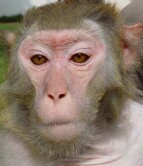
FRIDAY, Jan. 20 (HealthDay News) — Monkeys vaccinated with an anthrax capsule vaccine were protected against lethal anthrax infection, a new study has found.
The anthrax capsule is a naturally occurring component of Bacillus anthracis, the bacterium that causes anthrax.
This is the first successful use of a non-toxin vaccine to protect monkeys from anthrax, which is regarded as one of the most serious bioterrorism threats, according to the U.S. Army scientists who conducted the study.
Bacillus anthracis produces three main components that enable it to cause harm — lethal toxin, edema toxin and the capsule. During anthrax infection, the capsule surrounds the bacterium and protects it from destruction by the body’s white blood cells.
In this study, the researchers found that the anthrax capsule vaccine induced anti-capsule antibody responses in both rabbits and monkeys. Vaccinated rabbits were not protected against anthrax spores, but many of the vaccinated monkeys did survive.
The study appears in the Jan. 20 print issue of the journal Vaccine.
Current human vaccines for anthrax are based on the protective antigen component of the anthrax toxins, but there are concerns about relying on a single antigen and about anthrax strains that may be vaccine resistant, said senior author Arthur Friedlander of the U.S. Army Medical Research Institute of Infectious Diseases (USAMRIID).
“This is the first non-toxin anthrax vaccine shown to be protective in monkeys. In addition, this new capsule vaccine is expected to work against possible vaccine-resistant strains of anthrax, as well as in recipients whose immune systems may not respond to protective antigen alone,” Friedlander said in a USAMRIID news release.
While the findings of the new study are promising, scientists note that research involving animals often fails to produce similar results in humans.
More information
The U.S. Centers for Disease Control and Prevention has more about anthrax.

